Cover Story
Going out on a high
To say International Air Transport Association boss, Tony Tyler, surprised the industry when he announced he would step down in June is an understatement. But for the 2015 Orient Aviation Person of the Year and Lifetime Achievement winner “it was time someone else had a go”.
December 1st 2015
“Big news indeed”, was the general reaction from IATA staff when they learnt their boss since July 2011 would depart the organization after its annual general meeting in Dublin in June. Read More »
“Well, I have done five years and I have thoroughly enjoyed it,” he told Orient Aviation in an interview in Havana in November. “I realize how lucky I am to have gone from one of the best jobs in the industry running Cathay Pacific to another one of the best jobs in the industry running IATA.
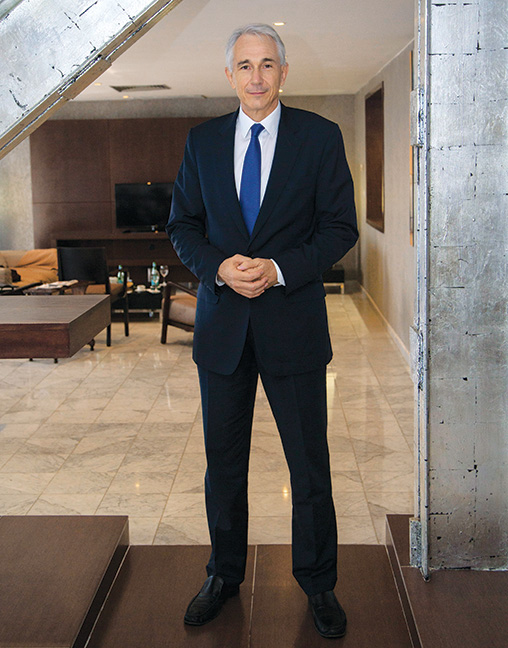 |
“But after five years, it is time someone else had a go. It’s a tiring job. There is a lot of travel and it’s a job where control of your own calendar is pretty much non-existent,” he said.
“You have to go when other people are organizing events and you have to be there. And it’s quite a demanding job in terms of your personal energy levels. But I keep in shape and I love it. What other job would have taken me to Brazzaville one week, Cuba the next and Jeddah the week after that? If variety is the spice of life then this is a pretty spicy job.”
In November Tyler’s travels, apart from Republic of the Congo, Cuba and Saudi Arabia, took him to London, San Juan and Montreal. “It’s not always like that though. In August the only flight I did was in a hot air balloon over Provence,” he said.
Tyler is the sixth director general and CEO of IATA in the association’s 70-year history. As a thirty-year veteran of Cathay Pacific Airways, he was no stranger to the workings of the organization. When he took over as the Hong Kong airline’s chief executive in 2007, he served on IATA’s board, including 12 months as chairman of the board of governors from June 2009.
He succeeded Giovanni Bisignani on July 1, 2011 after delivering an acceptance speech urging greater industry unity at the association’s annual general meeting in Singapore a month earlier.
Six months before that, he had - once again - taken the industry by surprise when he put himself forward for IATA’s top job while still at Cathay Pacific, an airline he clearly loved. “Tony’s timing is always good,” said one of his airline peers who holds Tyler in high regard.
Under Tyler, IATA has achieved heightened global recognition. He has tirelessly campaigned for IATA’s 260 members, motivated by his own deeply held personal belief that aviation is a force for good in the world.
The association, after undergoing a major internal restructuring, has brought IATA closer to its members and the market, a strategy enhanced by the strengthening of its local hubs in Singapore, Beijing, Amman, Miami and Madrid. The re-organisation has allowed IATA and its partners to quicken their pace of advocacy and chalk up a series of groundbreaking regulatory and commercial initiatives that are changing the industry for the better.
Successful initiatives have included persuading ICAO members at the organisation’s 2013 Assembly to develop a framework for a global Market Based Measure (MBM) by its next Assembly in 2016. In parallel and supporting ICAO, IATA has been is lobbying for its members to agree to a mandatory global carbon offset scheme as the industry’s preferred MBM.
| The right stuff “Rugby and aviation are both team efforts. To win at either you need a critical combination. For rugby it’s the mix of forwards and backs. In aviation it is a more complicated ecosystem, including airlines, airports, air navigation service providers, manufacturers and many more. But the basic principle is the same. Success only happens when you think and act as a team,” he said. “I am an unabashed supporter of rugby and an even bigger proponent for the role of aviation. Each of the 100,000 flights that arrive safely each day make our world more prosperous. Aviation is an unsung hero: supporting global events, facilitating the exchange of ideas across continents, making it possible to do business in global supply chains and reuniting families and friends over enormous distances.” Tony Tyler Airlines International October-November 2015 |
In spite of these achievements Tyler has no wish to blow his own trumpet. He knows that when he delivers his retirement address in Dublin, many of the programs he and his IATA teams have been driving will be works in progress for some time to come.
But when asked about the legacy he wanted to leave, he did not hesitate. “An organization which really delivers on its mission, takes the lead and serves the industry. But one that is really delivering value for its members and the broader air transport industry. One that everybody recognizes is a reliable source of industry insight, information and operations. One that gets things done and is driving the industry agenda forward.”
As for the big wins during his tenure, Tyler said it was a tough question. “Certainly one of the big wins was three years ago at the ICAO Assembly,” he said.
“It was something that, provided next year’s (ICAO) assembly is equally productive, should set the industry on course to provide the right regime for managing carbon emissions for many years to come.”
Just as crucial, said senior IATA staff who work with him, was Tyler’s dedication to deepen IATA’s relationships with some industry partners, particularly airports.
These included IATA’s Memorandum of Understanding with Airports Council International (ACI) on comprehensive co-operation and joint meetings with ICAO, ACI and CANSO in the aftermath of the shooting down of MH17.
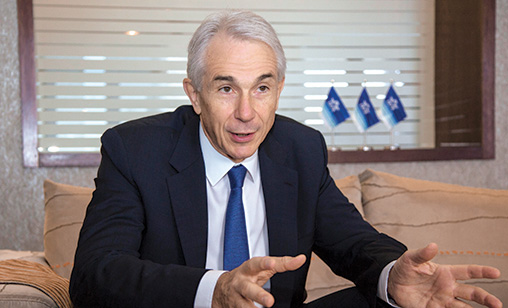 |
In combination with ACI, Smart Security – the former Checkpoint of the Future – is live at Amsterdam, London, Doha and Melbourne airports. Airlines also have agreed to the principles of passenger rights. Governments, at the behest of airlines, have agreed to revise the Tokyo Convention dealing with unruly passengers.
An impressive list of achievements, but it would not surprise those who know him. A UK national born in Egypt in 1955 - his father was a major-general in the British army – Tyler is regarded as a born diplomat who takes a measured and methodical approach to each issue or crisis he encounters.
Said a Cathay Pacific colleague who worked closely with him at the airline: “Tony’s leadership qualities were beyond doubt. He was admired and respected. He had the skill to take people with him. But for all his charm he has steel in him. He was the front man in the [very bitter Cathay Pacific Airways] pilot strike.”
Another challenge for Tyler and IATA was its relationship with GDSs. Global Distribution Systems (GDS) companies have had disagreements with IATA. The situation has clearly changed. “That’s something that will again set things up for some time to come,” he said.
Initially, many of the GDS opposed the concept of New Distribution Capability (NDC), which has been one of the major projects launched during Tyler’s time at IATA. He told Orient Aviation: “It could have died a death. Obviously, it was a good idea and the right idea, but we didn’t execute it well initially.”
“We had to rethink and take stock of where we were, particularly about bringing partners on board like the GDS. It wasn’t going to work if we didn’t have them with us. That was a big step forward when we got them on board.”
| A career well lived Tyler said the airline business can captivate people. After graduating with a degree in Jurisprudence from Oxford University he planned to go into law, but he quickly realized it was not what he wanted to do. He applied to two airlines, but was turned down. “So I joined the Swire group, which of course Cathay was a big part of. After a year in a road transport company in Australia, they pulled me into the airline. So I was very glad I hadn’t joined those other airlines. I won’t say which ones they were, but Cathay was great. “I was so lucky. I joined the airline in 1978 and my first job was assistant manager in Manila where I spent a year, before three years in head office. By 1980, the airline was really starting to grow. There was big expansion to Europe, London was launched and then big expansion a couple of years later to North America. “I was like a surfer who got to the top of the wave at the right time. In the 1980s there were a lot of fantastic jobs going [at Cathay Pacific] and you couldn’t help but be excited.” His arrival in Asia was nicely timed. China was opening up and big changes were occurring in Southeast Asia, Greater China, Japan and Korea as their economies surged. Along the way to the top job, Tyler worked in senior positions in Canada, Japan and the UK, as well as opening Cathay offices and operations in France and Italy. In 1996, he was appointed Director Corporate Development, essentially the number three job at the airline. During his eight years in the position, his remit covered a range of commercial and strategic issues and several challenges for the airline’s management team. The carrier had to weather the Asian financial crisis, the move from Kai Tak airport to the new airport on Lantau, the impact of the 9/11 massacre on air traffic and Asia’s Severe Acute Respiratory Syndrome (SARS) outbreak, to name a few. He became chief operating officer in 2005 and chief executive in 2007. “Tony was not crazily ambitious, but he worked his way to the top. He was a loyal deputy to Philip Chen, but once he became chief executive he tackled it with his usual skill. He loves the business and he loves Cathay,” a well- placed Cathay colleague told Orient Aviation. |
Nevertheless, he isn’t claiming victory. “NDC will never finish. We have set up standards for the development of distribution through the indirect channel and other ways which will now presumably carry on until someone else betters it,” he said.
“We have gone past the tipping point. It is established this is the right way to go. Smaller businesses are coming on board as well as putting the building blocks in place for airlines to change the way they merchandise. So that snowball is well and truly rolling down the hill and getting bigger every day. I am pleased about that.”
Tyler emphasised there are factors that distinguish IATA from other trade associations. “One is the huge financial system we operate, which is unusual for a trade association. It is part of the internal plumbing of the airline industry and the industry could not operate efficiently without it,” he said.
“The other difference is the surplus we generate from our commercial activities. We are a not-for-profit organization, so we plough the surplus back into things we do for the industry such as safety programs and the development of a financial system. It is paid on a cost recovery basis by the participants in the system.
“We are very much more than just an advocacy group. In all those areas we are strong. It’s one of the things that kept me up at night, but also kept me focused on remaining strong in those areas.”
Geopolitically, Tyler has trod an independent path when asked to comment on issues that involved his airline members, including the current impasse and very angry public exchanges between the big U.S. airlines and their Gulf rivals over alleged subsidies.
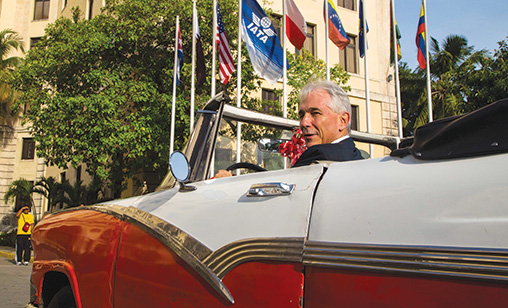 |
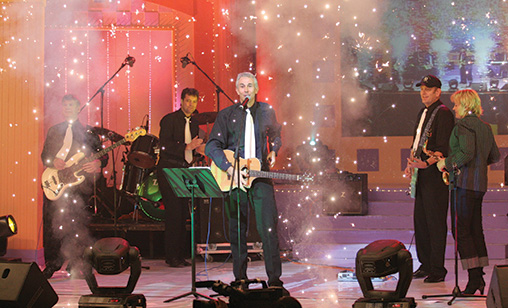 |
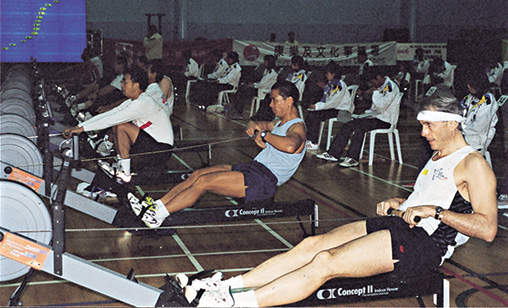 |
“I am very clear in my own mind that IATA cannot, and does not need to be involved in those sorts of arguments. It’s nothing new. It is being pursued particularly vigorously at the moment, but they’re not new issues,” he said.
“Airlines that want more capacity always have argued loudly and airlines in countries that take a different view have always found reasons for resisting it. That’s what’s going on here.”
IATA operates in an area where the surface overlaps, he said. “I guess people say, ‘oh, this reflects badly on IATA when people are fighting each other’. Actually, the people who are fighting each other in this argument, if you take the main three on each side, are among the strongest supporters of IATA. They all have lots of people on the industry committees. They are all great supporters of our programs like NDC, Fast Travel, e-freight and the e-airway bill and IOSA (IATA’s operational safety audit).”
Nor does he believe the U.S. carriers’ stance represented a step back from the concepts of liberalization and open skies. “Markets are being liberalized all the time. Every time two governments sit down to negotiate traffic rights more traffic rights become available. Do they always go the way of complete open skies? No, not so much,” he said.
“The U.S. has open skies with most of their major aviation partners so there are not a lot more dominos to fall. But you never hear of anyone taking less. You always hear of more traffic rights being granted whenever governments get together.”
Safety and security have been another priority under Tyler, with the disappearance of Malaysia Airlines flight MH370, the shooting down of MH17 and the recent bombing of a Russian airliner over Egypt, still very raw in the industry’s mind.
“MH370 remains a complete mystery. The part found a few months ago indicated it must have come down in the Indian Ocean, but we are no wiser about how, why or where. It is going to be one of those mysteries for a long time I fear,” he said.
“MH17 was a terrible crime. The Dutch safety board issued a very comprehensive report on what happened. Not necessarily who did it, but what happened. We are having a good look at some of their recommendations, including how it mentioned IATA and our role in improving the security of overflight. We will obviously respond in due course.
“With this recent one – the downing of a Russian aircraft - certainly one imagines the government, in announcing it was a bomb, knew what it was talking about. Assuming that, we need to find out how it was placed on the aircraft and then what we do about it? We are all hoping we don’t see a knee jerk reaction from regulators.”
More profiled screening of airline customers is the other side of the security coin. “The whole hassle of screening at airports has been another work stream during my time,” he said.
“Governments, airports and airlines all agree we have a mass of regulation to work with and working within that framework makes life difficult. The inconsistencies, whether it’s iPads in or iPads out, shoes on or shoes off, jackets on or jackets off, all the different liquids and gels treatments, are confusing. It brings the whole system into disregard. We have to go back to basics. What are we trying to do? What is the best way of doing it?”
Tyler said there is one area of his job where he has not been totally successful - fully convincing governments how important aviation is to their economies. “It’s been a constant drumbeat during my tenure. I’ve made a lot of speeches and I’m pretty sure I’ve mentioned it in every one.
| Taking a break but … After Tyler packs up his desks in Geneva and Montreal he will head back to Hong Kong, where he has an apartment, and then divide his time between the city where he spent so many years and his house in the south of France. But he won’t be putting his feet up. “If one or two non-executive or advisory positions come my way, or if I’m interested and there is a contribution I can make, I’d like to keep connected with the industry in that way,” he said. “And I have lots of things I want to do. There are places I’ve half seen that I want to see properly. I want to play my guitar a bit more as well as enjoy more time off.” |
“I think you have to keep saying it. You have to keep banging out these messages until you are so bored with saying the same thing. That’s when you begin to think they might be beginning to listen,” he said.
Some governments get it much better than others, he said. “I am disappointed that it is still not really understood in Europe. In the EU, the commissioner and the director general of transport get it, but if you look at the wider community and the institutions in Europe, they don’t.
“The UK has the highest aviation tax in the world. Germany’s still got its taxes. So at a national level they don’t really get it. Or they say yes, we get it, but we want the revenue. They would receive much more revenue from more tourists than anything they collect off the back of the airlines.”
One other part of his portfolio that does please him is the industry’s safety record. “The nice thing about my tenure so far, knock on wood, is that the accident rate is trending down. I’m not claiming any personal credit for these things, but it does show the industry is in better shape and the safety one is very satisfying,” he said.
He remains totally optimistic about the future of the industry, despite the challenges it faces. “There are a lot of factors that contribute to its complexity and why it is very difficult. As an industry, we depend on so many outside factors. Fuel prices have a huge impact because we burn so much of it and we need it so badly,” he said.
“Then there is the state of the world economy. Even if the world economy is weak people are still going to eat. So if you’re in the food business you can be pretty cool because people are still going to eat.
“But they aren’t necessarily going to travel. Or they’ll only travel at a much lower price so everyone has to keep dropping prices to keep getting some people’s discretionary income. So we have those uncertainties. And we are very vulnerable to sudden events such as social unrest, terrorism, pandemics and so on in a way most other industries are not.
“It’s also fiercely competitive. You don’t get cross border consolidation in the same way as other industries. Until that’s changed, and I don’t think it is going to change any time soon, we are going to see a very fragmented industry. So it’s going to be difficult.
“Having said that airlines will still find ways of working with all these challenges. The airline industry provides fantastic value for money. The real price of air fares has come down massively over the years, which is why so many people are travelling. Almost three and a half billion people are travelling every year because they can afford it. The trick is to make money doing it.”